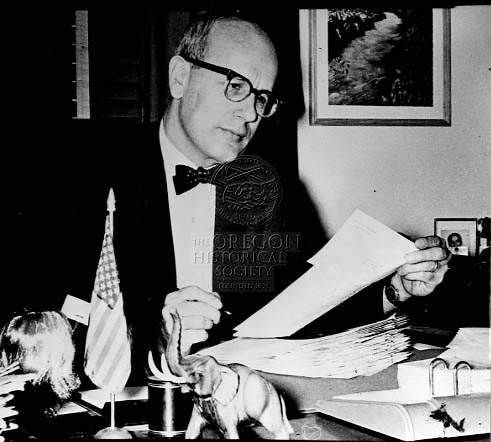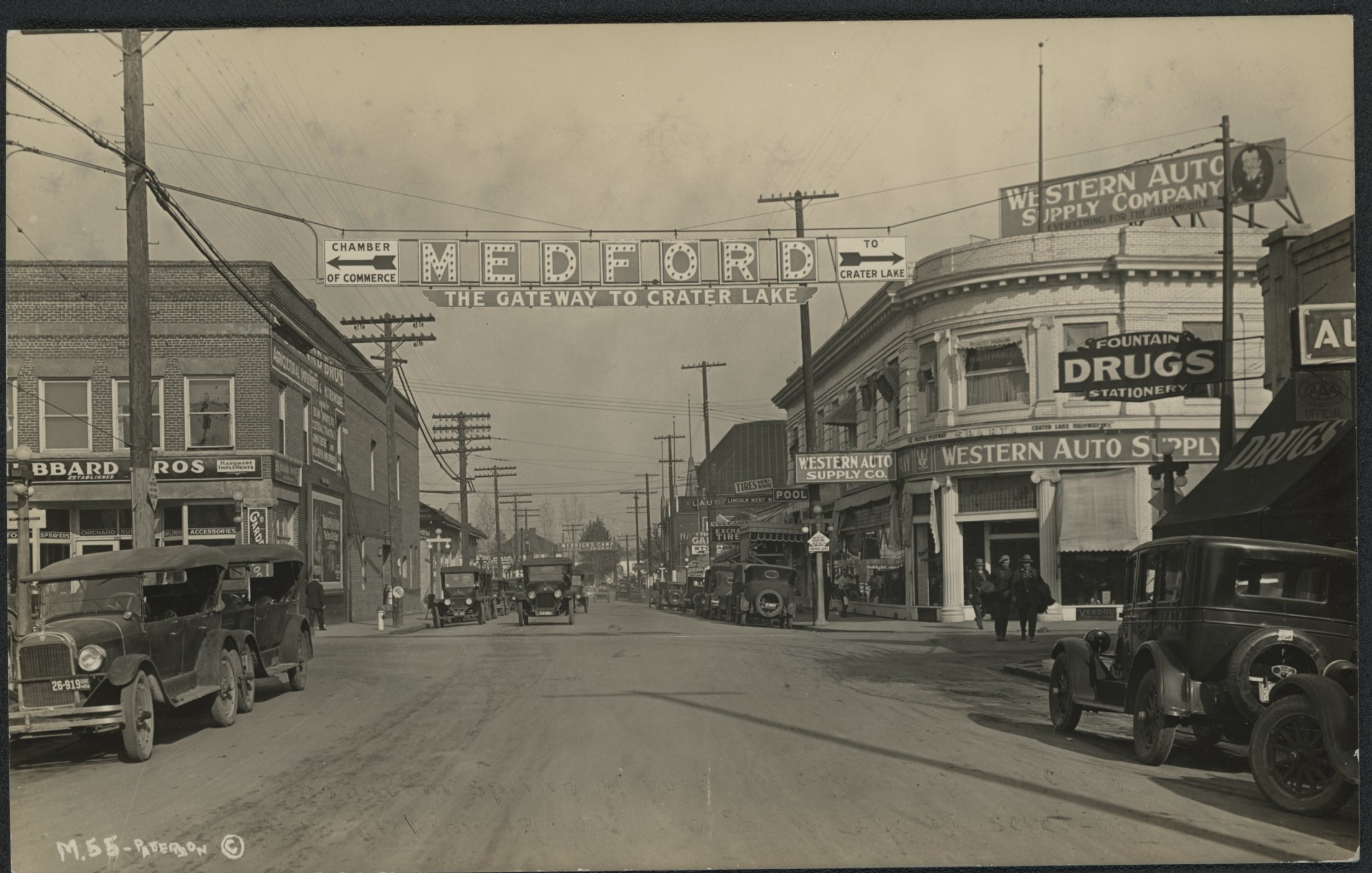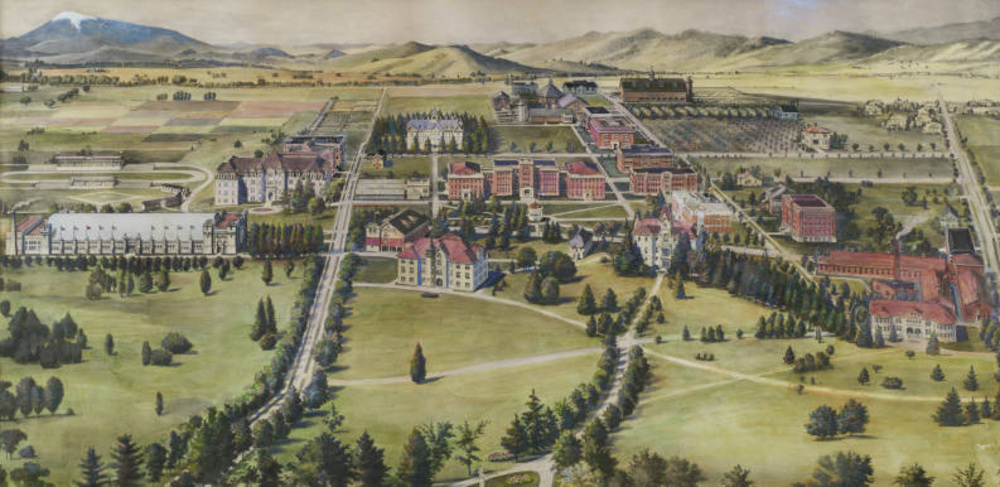John Dellenback exemplified the pragmatic bipartisan nature of Oregon politics during the 1960s and 1970s. He served four terms in the U.S. House of Representatives and two years as director of the Peace Corps. To the end of his life, Dellenback was known for being an optimist and open to new ideas. Like many other Oregon Republicans of his time, he valued Oregon's natural environment. One of his most visible legacies is the creation of the Oregon Dunes National Recreation Area south of Florence.
Born in Chicago on November 6, 1918, John Richard Dellenback was the son of a Democratic state legislator who represented an area dominated by Democrats. He was an Eagle Scout and had a lifelong commitment to the Presbyterian Church, serving as a charter member of the Medford Westminster Presbyterian Church and on its first board of elders. Dellenback graduated from Yale University in 1940 and joined the U.S. Navy in 1942, serving in the Pacific Theater in World War II until 1946 and earning the rank of lieutenant.
Dellenback married Mary Jane Benedict in 1948, whom he met at a summer camp where both worked as counselors. After graduating from the University of Michigan Law School in 1949, he took a teaching position at Oregon State College (now Oregon State University). In 1951, he established a full-time law practice in Medford.
Soon after being elected to the Oregon House of Representatives in 1960, Dellenback was named chair of the Judiciary Committee. He found a lifelong friend and ally in Governor Mark O. Hatfield, sharing with him a pragmatic moderate approach toward politics and a deep sense of religion. In 1966, Dellenback was elected to the U.S. House of Representatives, representing the Fourth Congressional District, which included Eugene and Medford. The district had a plurality Democratic voter registration, but Oregon was marked by nonpartisan or bipartisan political values at the time, and Dellenback’s straightforward, nonideological style ensured easy electoral success. He carried his principled pragmatism into Congress, enabling him to work both sides of the aisle effectively.
In Congress, Dellenback was primarily interested in educational and environmental issues. His greatest contribution to Oregon may have been his successful work in 1972 to pass the bill creating the Oregon Dunes National Recreation Area, where the John Dellenback Dunes Trail honors him. He also supported such progressive legislation as Title IX of the Civil Rights Act, which mandated equal opportunity for men and women attending colleges that received federal funds, most visibly advancing women’s athletics. He also advocated for an amendment that made Alaska Pipeline permit-holders and shippers liable for oil spills.
Dellenback was a key supporter of the anti-union West Coast Dock Strike Bill of 1971, which was generally popular in his district because the strike bottled up lumber and other shipments. He received a high rating from the Chamber of Commerce and was generally conservative on business and fiscal issues. “I consider myself as a moderate liberal,” the four-term congressman said. “In economic affairs I tend to be conservative.”
During his years in public life, Dellenback was widely respected for his work ethic and his willingness to hear ideas from many sources. He strongly advocated introducing young people to politics and often hosted at his office and home those who were just starting careers and were participants in his internship program, which drew some of the brightest high school students in his district.
He lost the 1974 election to Democrat Jim Weaver, a result widely attributed to fallout from the Watergate scandal and Dellenback’s strong association with President Nixon even as the scandal unfolded. In 1975, President Gerald Ford appointed him director of the Peace Corps, where he built a positive reputation through his travel and his efforts to publicize and support the agency’s people and work on the ground. According to the Peace Corps website, Dellenback “worked to make the best possible health care available to Volunteers. He also placed great emphasis on recruiting generalists. He believed in taking committed applicants without specific development skills and providing concentrated training to prepare them for service.”
After leaving the Peace Corps in 1977, Dellenback was named president of the Christian College Coalition. By the time he stepped down from that position in 1988, the Coalition’s membership had increased from ten colleges to seventy-seven. At the age of seventy-eight in 1996, he became the oldest person at the time to receive a kidney transplant when his wife donated a kidney to him.
John Dellenback returned to Medford in 1988 and became active in local community affairs once more. He died in Medford on December 7, 2002.
-
![]()
John Dellenback, 1949.
Courtesy Oregon State University Special Collections and Archives Research Center
-
![]()
John Dellenback.
Courtesy Oregon Hist. Society Research Lib., Journal, 002416
Related Entries
-
![Medford]()
Medford
Medford, the county seat of Jackson County, was platted in 1883 in the …
-
![Oregon Dunes National Recreation Area]()
Oregon Dunes National Recreation Area
Created by Congress in 1972, the Oregon Dunes National Recreation Area …
-
![Oregon State University]()
Oregon State University
Oregon State University (OSU) traces its roots to 1856, when Corvallis …
Map This on the Oregon History WayFinder
The Oregon History Wayfinder is an interactive map that identifies significant places, people, and events in Oregon history.
Further Reading
Burke, Anita. "Former US Representative John Dellenback Dies." Medford Mail Tribune, December 8, 2002,
Gates, Nancy. “John Dellenback, Republican Representative from Oregon.” Ralph Nader Congress Project: A Citizens Look at Congress, August 1972.
“John Dellenback.”Oregon Legends: from Southern Oregon Television, affiliated with Oregon Public Broadcasting (film). https://video.soptv.org/video/soptv-specials-oregon-legends-john-dellenback-story/ (Originally aired November 1, 2004)
"John Dellenback, 84; Peace Corps Director, Oregon Congressman." Los Angeles Times, December 10, 2002.
John Dellenback papers, 1964-2000. University of Oregon Libraries, Special Collections and University Archives.
Roemeling, Alysha. "Small Gift, Big Impact." Medford Mail Tribune, April 14, 2017.





